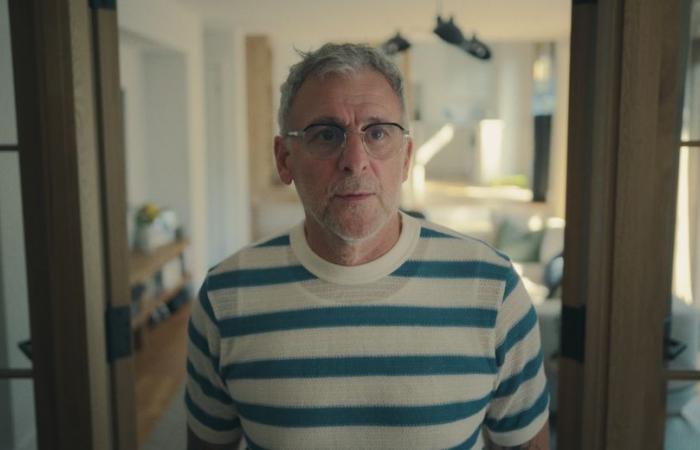While it seems less and less taboo to talk about psychological help, most men still prefer to resolve their problems alone. Hence the injunction launched by actor Jean-Nicolas Verreault: “Guys, we need to talk”, title of a documentary broadcast on Crave, Noovo, Canal Vie and Canal D.
Published at 7:00 a.m.
Talking about men’s mental health is a desire that Jean-Nicolas Verreault has had for years. He feels concerned because he experienced an episode of anxiety in the past that landed him in the hospital, but also because he is the father of three daughters and he felt concerned about the statistics regarding guys. “I wanted to understand where we were,” he explains. I wondered what awaits my daughters and the kind of men who would gravitate towards them. »
Guys, we need to talk draws up an “inventory”, with the ambition of moving things forward. The initial observation is not very encouraging: in 2025, more men will continue to commit violent acts than women, kill themselves in greater numbers and perpetuate stereotypes which, in the long term, will often prove harmful. Which is not to say that nothing is improving.
Jean-Nicolas Verreault meets many men, often well-known, able to say that they have already consulted a psychologist and the benefits they have derived from it. Two of them are friends of his: the novelist Patrick Senécal and the actor, director, host and producer Patrick Huard. Men with whom he developed a relationship of trust and deep intimacy.
This trio gets together to play board games. This detail is crucial: these guys don’t get together to chat about their lives, but around an activity.
IMAGE FROM THE DOCUMENTARY GUYS, WE NEED TO TALK
Patick Huard’s view of himself and the men around him is both critical and sensitive in Guys, we need to talk.
We laugh and we have fun, but it’s also a time when we’ll tell each other what’s going well or what’s not going well. We listen to each other. I also find that people underestimate the power of activity to create connections.
Patrick Huard
-Patrick Huard insists: context plays a crucial role. It is the intimacy and lightness of the moment that makes him and his friends “let their guard down”. The informal setting offers another advantage, according to him: “You can stop wherever you want,” he says. You say what you want to say, without feeling forced or obligated to talk about it for 20 minutes if you don’t want to. »
Still resistance
Jean-Nicolas Verreault’s investigation therefore encourages him to look for other spaces where the guys can confide in each other. Is a hockey locker room one of them? Not so sure. He had to contact around ten garage league teams to find one who agreed to host him with a film crew. “It’s revealing,” according to him, of men’s resistance. The guys who agree to speak with him, however, assure us, with a few nuances, that their locker room can be a space of confidences. Especially after the match, underlines one of the players of this multi-generational team. Another, older, nevertheless specifies that it still involves humor and that it often remains “superficial”, even if things have evolved a lot since he started playing 35 years ago.
Hearing Patrick Huard talk about his own journey and his way of being a father, we deduce that he has worked a lot on himself. He says he was lucky to grow up in an environment where both his parents expressed their emotions. “We wrote to each other a lot,” he said. In my family, we gave each other cards on all occasions. » And what was said there was precisely not “superficial”, we understand. He adds that starting to play rather than doing humor also encouraged him to be more interested in others, to observe them and to better perceive their moods. “It started a process [d’ouverture] “, he said.
Guys, we need to talk tries a lot to encourage men to seek psychological help, which they still do too little. Jean-Nicolas Verreault believes, however, that to create real change, mental health should be part of the healthy lifestyle that we learn at school in the same way as physical education.
He says this while knowing that our system, where psychological help is not easy to obtain, is far from it.
Be a role model
What to do in the meantime? Lead by example, thinks Patrick Huard. “You have to show your vulnerabilities. Be able to say things, even if you’re crooked, and apologize if you expressed yourself badly,” he suggests. The actor and director assures that he never hesitates to show his weaknesses to those close to him and that with his teenage son, he talks as much about what worries him as about the good it does him to confide or consult s he needs it.
This barrier remains difficult to overcome for many men of all ages, but what we perceive when looking Guys, we need to talkis that once it has fallen and men have felt the good it does them, there is no going back. “Once the valves are open, it’s much easier and you realize that it’s not a failure [que de demander de l’aide]it is proof of courage, believes Jean-Nicolas Verreault. If there’s one thing I’d like guys to remember, it’s that seeking to understand what you’re feeling and what you’re experiencing is a sign of strength. »
The documentary Guys, we need to talk is available starting this Wednesday on Crave and Noovo.ca. It is presented this Wednesday on Canal D at 9 p.m. and on Canal Vie at 10 p.m. It will air on Noovo on January 26 at 8:30 p.m.







